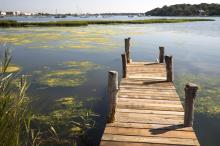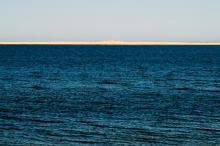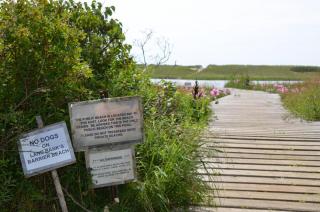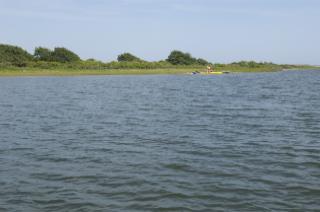Coastal ponds
2014
On Cape Cod ambitious efforts are underway to remediate ponds and estuaries. And when coastal ponds decline, so do property values, the executive director of the Cape Cod Commission, told a meeting at the Katharine Cornell Theatre.
2012
A pair of quahauggers stood waist-deep in Sengekontacket Pond early Thursday morning, the late August sun glinting off the calm water as they raked hardshell clams, perhaps a basketful for their dinner. The pond has been open to summer shellfishing this year for the first time since 2007.
Cribbing a famous line from an infamous late U.S. president, it is public enemy number one in Southeastern Massachusetts, although this time the enemy is not drugs but nitrogen. Nitrogen poses a serious threat to the health of our coastal ponds and saltwater embayments that were once pristine and are now in alarming states of decline. Eelgrass beds are gone or disappearing, and along with them the clean shellfish that both provide a rich source of food and form a key cog in the local economy.
2010
Last summer the Vineyard Conservation Society succeeded in convincing Islanders that their ponds were indeed in peril. At this year’s Ponds in Peril forum, Islanders learned what they could do about it.
2007
Due to high bacteria counts, the state Division of Marine Fisheries
closed portions of two large Island ponds to shellfishing this week
- one up-Island and the other down-Island.
The closures are effective immediately in part of the Tisbury Great
Pond and at Major's Cove in Sengekontacket Pond, although town
leaders have not yet received official letters of notification.
2004
Putting in Place a Plan to Save Our Ponds Costly and Politically
Tricky, Forum Hears
By CHRIS BURRELL
By the time anyone notices that a coastal pond or bay is choked with
floating drifts of green algae, the events that caused it happened
decades ago.
Nitrogen leaching from septic systems and runoff of pollutants from
black-topped roadways and parking lots did their damage 20 or 30 years
ago, said marine scientist Brian L. Howes, a professor at University of
Massachusetts, Dartmouth.





